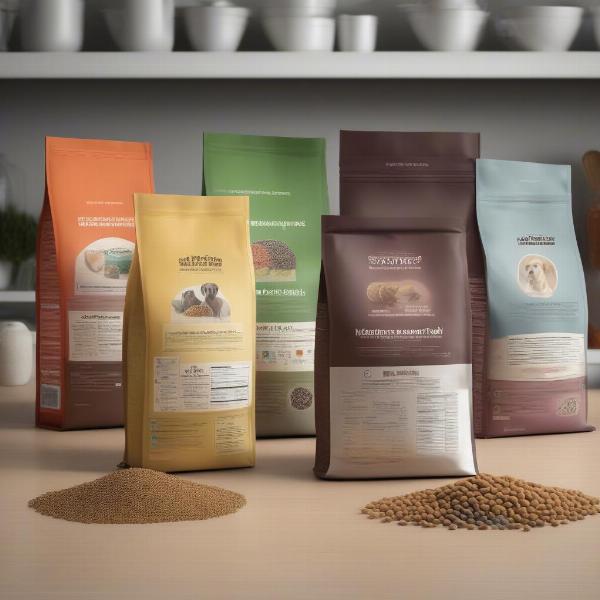Choosing the best husky dog food can be a daunting task, especially with the overwhelming variety available on the market. Huskies are energetic, intelligent, and stunningly beautiful dogs with specific dietary needs. Feeding them the right food is crucial for maintaining their health, supporting their active lifestyle, and ensuring a long, happy life. This guide will help you navigate the complexities of husky nutrition and find the perfect food to fuel your furry friend’s adventures.
Understanding Your Husky’s Nutritional Needs
Huskies, originally bred for sledding in harsh arctic conditions, have unique metabolic requirements. Their bodies are incredibly efficient at converting fat into energy, making a diet with moderate fat and high-quality protein essential. While protein fuels their muscles, healthy fats provide sustained energy for those long runs and playful romps.
Key Nutrients for Huskies:
- Protein: Look for dog foods with animal-based protein sources like chicken, fish, or lamb, as the first ingredient. This ensures your husky receives the amino acids necessary for muscle growth and repair.
- Fat: A moderate fat content is vital for maintaining energy levels and a healthy coat. Sources like fish oil and flaxseed provide beneficial omega-3 and omega-6 fatty acids, promoting skin and coat health.
- Carbohydrates: While not the primary energy source for huskies, complex carbohydrates provide fiber for digestive health. Choose whole grains like brown rice and oatmeal over fillers like corn and wheat.
Choosing the Right Food Type: Kibble vs. Wet Food
Both kibble and wet food have their advantages. Kibble is generally more affordable, convenient to store, and helps maintain dental health. Wet food, on the other hand, is often more palatable for picky eaters and offers higher hydration. You can also consider a combination of both.
Factors to Consider:
- Age: Puppies require food specifically formulated for their growth and development, while senior huskies benefit from formulas that address age-related changes.
- Activity level: Highly active huskies need more calories than those with a more sedentary lifestyle. Adjust the feeding amount accordingly.
- Allergies or sensitivities: If your husky has any allergies, choose a hypoallergenic formula or a single-protein source diet.
Reading Dog Food Labels: Decoding the Ingredients
Don’t be intimidated by the long list of ingredients on dog food labels. Learning to decipher them is key to choosing the best food for your husky. Look for clearly identified meat sources, avoid artificial flavors and colors, and prioritize whole grains over fillers.
What to Look For:
- Named meat sources: The first ingredient should be a specific meat source, such as “chicken” or “salmon,” not a generic term like “meat by-product.”
- Healthy fats: Look for sources of omega-3 and omega-6 fatty acids, like fish oil and flaxseed.
- Limited fillers: Avoid foods with excessive amounts of corn, wheat, and soy, which can be difficult for some huskies to digest.
 Comparing Dog Food Brands
Comparing Dog Food Brands
Top Recommended Husky Dog Foods
While individual needs vary, some consistently top-rated husky dog foods include brands that prioritize high-quality protein, moderate fat, and wholesome ingredients. Consult with your veterinarian to determine the best fit for your husky.
Conclusion: Nourishing Your Husky Companion
Choosing the best husky dog food requires careful consideration of your dog’s individual needs. By understanding their nutritional requirements, reading labels carefully, and consulting with your vet, you can ensure your husky receives the optimal nutrition to thrive. husky dog food specials can also help you save money on high-quality options.
FAQ:
- How much should I feed my husky? The amount depends on your husky’s age, activity level, and the specific food. Follow the feeding guidelines on the food packaging and adjust as needed.
- Can I feed my husky raw food? While some owners choose to feed raw diets, it’s essential to consult with your veterinarian to ensure nutritional balance and minimize health risks.
- What are the signs of food allergies in huskies? Common signs include itching, skin irritation, gastrointestinal upset, and ear infections.
- Should I supplement my husky’s diet? Generally, a complete and balanced dog food provides all the necessary nutrients. However, consult with your vet before adding any supplements.
- How often should I switch my husky’s food? Sudden food changes can cause digestive upset. If switching foods, do it gradually over several days.
- What are some good treats for huskies? Choose healthy treats made with natural ingredients, such as freeze-dried meat or single-ingredient treats.
- My husky is a picky eater. What can I do? Try adding warm water or a small amount of wet food to their kibble to make it more appealing.
dog fans might also be interested in learning more about dog nutrition and care. For husky-specific toys, check out our dog toys for huskies selection. If you are interested in other breeds, we also have resources for pom dogs for sale. You can find more information on big dog breeds good for apartments.
ILM Dog is a leading international online resource dedicated to providing expert advice on dog care and breeding. We offer a wealth of information on various topics, including dog breeds, health, training, nutrition, grooming, and much more. We strive to empower dog owners with the knowledge and resources they need to provide the best possible care for their furry companions. Contact us today for expert advice and guidance. Email: [email protected], Phone: +44 20-3965-8624. For more information, please visit ILM Dog.